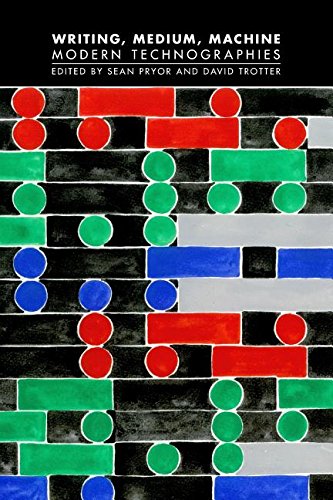Sean Pryor, David Trotter (eds.): Writing, Medium, Machine: Modern Technographies (2016)
Filed under book | Tags: · literature, machine, media, media archeology, media technology, technology, theory, writing

“This is a collection of thirteen scholarly essays which explores the mutual determination of forms of writing and forms of technology in modern literature. The essays unfold from a variety of historical and theoretical perspectives the proposition that literature is not less but more mechanical than other forms of writing: a transfigurative ideal machine. The collection unearths representations in literature and film of a whole range of decisive technologies from the stereopticon through census-and slot-machines to the stock ticker, and from the Telex to the manipulation of genetic code and the screens which increasingly mediate our access to the world and to each other. It also investigates concepts which articulate the relation between writing and technology: number, measure, encoding, encryption, the archive, the interface.”
Contributors: Ruth Abbott, John Attridge, Kasia Boddy, Mark Byron, Beci Carver, Steven Connor, Esther Leslie, Robbie Moore, Julian Murphet, James Purdon, Sean Pryor, Paul Sheehan, Kristen Treen.
Publisher Open Humanities Press, 2016
Technographies series
Creative Commons BY-SA 4.0 License
ISBN 9781785420061
223 pages
PDF (updated on 2016-11-12, with bookmarks, metadata and compressed, via Malcolm Dean, 2 MB)
PDF (from publisher, 3 MB)
Lucie Vágnerová: Sirens/Cyborgs: Sound Technologies and the Musical Body (2016)
Filed under thesis | Tags: · body, cyborg, electronic music, feminism, gender, music, sound art, technology, women
“This dissertation investigates the political stakes of women’s work with sound technologies engaging the body since the 1970s by drawing on frameworks and methodologies from music history, sound studies, feminist theory, performance studies, critical theory, and the history of technology. Although the body has been one of the principal subjects of new musicology since the early 1990s, its role in electronic music is still frequently shortchanged. I argue that the way we hear electro-bodily music has been shaped by extra-musical, often male-controlled contexts. I offer a critique of the gendered and racialized foundations of terminology such as “extended,” “non-human,” and “dis/embodied,” which follows these repertories. In the work of American composers Joan La Barbara, Laurie Anderson, Wendy Carlos, Laetitia Sonami, and Pamela Z, I trace performative interventions in technoscientific paradigms of the late twentieth century.
The voice is perceived as the locus of the musical body and has long been feminized in musical discourse. The first three chapters explore how this discourse is challenged by compositions featuring the processed, broadcast, and synthesized voices of women. I focus on how these works stretch the limits of traditional vocal epistemology and, in turn, engage the bodies of listeners. In the final chapter on musical performance with gesture control, I question the characterization of hand/arm gesture as a “natural” musical interface and return to the voice, now sampled and mapped onto movement. Drawing on Cyborg feminist frameworks which privilege hybridity and multiplicity, I show that the above composers audit the dominant technoscientific imaginary by constructing musical bodies that are never essentially manifested nor completely erased.”
PhD Dissertation
Publisher Graduate School of Arts and Sciences, Columbia University, 2016
Advisor: Ellie M. Hisama
242 pages

